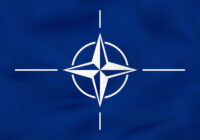Building resilience within Western societies must constitute a new priority.
“Fear isn’t so difficult to understand. After all, weren’t we all frightened as children? Nothing has changed since Little Red Riding Hood faced the big bad wolf. What frightens us today is exactly the same sort of thing that frightened us yesterday,” claimed Alfred Hitchcock, an undisputed icon of 20th-century cinematography and a master connoisseur of fear.
Hitchcock’s words are largely applicable to the field of international security. There are enough “old” threats to worry about, ones that don’t change every so often — WMDs are still WMDs, arms races have not diminished and technology still poses a potentially grave security threat. Perhaps, however, we in Europe ought to change our minds a little as a “new” security threat is at hand. Most worrying of all is that it has arrived from Russia in the form of an “unholy trinity” of hybrid, cyber and hyperwarfare threats.
At the strategic level, what Russia essentially seeks is the undoing of Western democratic standards that have prevailed since the fall of the Berlin Wall. As a means of delivering on this ambition, Russian entities have been actively utilizing the “unholy trinity” as key enablers and multipliers of intent. To this end, as the GLOBSEC NATO Adaptation Initiative argues, Russia has established a strategic continuum between hybrid, cyber and (potentially) hyperwarfare to divide, weaken and potentially disable NATO defenses and likeminded Western partnerships.
Hybrid Threats
On the cyber front, the recently revealed practices of Cozy Bear, a Russian cyber-enabler group believed to be behind the hacking of the 2016 US election, clearly signal that should NATO ever turn the score (in its relationship with Russia) back to its advantage, it will need to take a look within before addressing the symptoms of rising insecurity along its borders. In other words, without enhancing our democratic resilience, we cannot credibly seek to stabilize Ukraine, fight terrorism, progress arms controls or advocate energy-policy interests.
Building resilience within Western societies must constitute a new priority. The Cozy Bear revelations also demonstrate how important transatlantic (in this case Dutch-American) cooperation proved to be in minimizing harm. NATO’s reaction to this challenge has been clear and direct via its support for a gradual development of cyber offence (or active defense) capabilities as essentially another layer of allied deterrence.
On the hybrid front, Western societies continue to be steadily tested by Russian disinformation and propaganda. These campaigns have been clearly oriented toward the exploitation of contemporary public anxieties about stagnating (middle-class) living standards, rising internal security challenges in multicultural societies and depreciating democratic accountability of Western political institutions. The recent poisoning with a nerve agent of a former Russian spy, Sergei Skripal, on British soil clearly demonstrated Russia’s preparedness to test the level of allied solidarity in the event of an unexpected attack.
Lastly, on the hyperwar front, every military challenger (including Russia) has been seeking to exploit the exponentially increasing opportunities of technological advancement to cut NATO’s military primacy. Russia’s latest announcements regarding arms development clearly demonstrate Moscow’s readiness to sustain its strategic competition with the alliance.
As previously argued by the GLOBSEC NATO Adaptation Initiative, NATO’s adversaries and rivals already consider themselves at war with the alliance and its values. This is nothing new. What’s different, however, is that the character of warfare has undergone a profound evolution. Thirty years ago, NATO faced a single adversary. Back then, the alliance’s pathway to victory was clearly defined by military superiority and economic sustainability — something the Soviet Union completely failed to master. If only it were that simple today.
It no longer matters that our societies, businesses and individuals are at the cutting edge of technological advancement. These are also systematically and increasingly utilized by our enemies, adversaries and rivals (including Russia) against us — take the most obvious example of social media. In short, “they” weaponize “our” seemingly harmless and beneficial tools against “us.”
Critical Symmetry
Hence, we must treat our democratic (not only electoral) processes as part of our critical infrastructure. We need to develop the capacities to mitigate cyberthreats. There should also be a drive for more robust public diplomacy, greater institutional transparency and more tangible political accountability.
That said, Europe and its Western allies retain a vested interest in improving relations with Russia. The security challenges and threats that we mutually face (the proliferation of WMDs, spread of terrorism, uncontrolled migration, organized crime, etc.) can only be efficiently addressed by adopting and sustaining a pragmatic, balanced and constructive modus operandi. For that, however, we need symmetry.
Not only symmetry in terms of military capabilities but also in our societies’ resilience. Moscow needs to see and confront a politically confident and united West. We are currently missing this confidence, which directly invites the other side to do the only thing that makes geopolitical sense — exploit this opportunity for its own benefit. Europe and NATO will only start to rebalance its relations with Russia once they have identified and tackled the critical asymmetry in their internal resilience.
Hitchcock believed that the only way to get rid of our fears is to face them. A considerable step toward the desired symmetry might come with the NATO summit in Brussels earlier this month. And although the alliance is expected to move steadily with the military goals set in 2014, political challenges might remain unaddressed.
*[GLOBSEC a partner institution of Fair Observer.]
The views expressed in this article are the author’s own and do not necessarily reflect Fair Observer’s editorial policy.
Photo Credit: Titima Ongkantong / Shutterstock.com
Support Fair Observer
We rely on your support for our independence, diversity and quality.
For more than 10 years, Fair Observer has been free, fair and independent. No billionaire owns us, no advertisers control us. We are a reader-supported nonprofit. Unlike many other publications, we keep our content free for readers regardless of where they live or whether they can afford to pay. We have no paywalls and no ads.
In the post-truth era of fake news, echo chambers and filter bubbles, we publish a plurality of perspectives from around the world. Anyone can publish with us, but everyone goes through a rigorous editorial process. So, you get fact-checked, well-reasoned content instead of noise.
We publish 2,500+ voices from 90+ countries. We also conduct education and training programs
on subjects ranging from digital media and journalism to writing and critical thinking. This
doesn’t come cheap. Servers, editors, trainers and web developers cost
money.
Please consider supporting us on a regular basis as a recurring donor or a
sustaining member.
Will you support FO’s journalism?
We rely on your support for our independence, diversity and quality.






